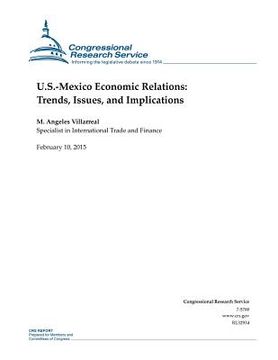Reseña del libro "U.S.-Mexico Economic Relations: Trends, Issues, and Implications (en Inglés)"
During the 114th Congress, policy makers will likely maintain an interest in Mexico on issues related to cross-border trade and investment; Mexico's economic reform measures, especially in the energy sector; the Trans-Pacific Partnership (TPP) agreement negotiations; NAFTA and WTO trade issues; and U.S.-Mexico border management. Congress may also take an active interest in ongoing bilateral efforts to promote economic competitiveness, increase regulatory cooperation, and pursue energy integration. Under the U.S.-Mexico High Level Economic Dialogue (HLED), which was launched in September 2013, the United States and Mexico are striving to advance economic and commercial priorities through annual meetings at the Cabinet level that also include leaders from the public and private sectors. Another bilateral initiative that may be of interest to policy makers is the High-Level Regulatory Cooperation Council (HLRCC), launched in February 2012, which is intended to help align regulatory principles. In addition, the two countries have a bilateral initiative for improving border management under the Declaration Concerning 21st Center Border Management that was announced in 2010. The economic and trade relationship with Mexico is of interest to U.S. policy makers because of Mexico's proximity to the United States, the high level of bilateral trade, and the strong cultural and economic ties that connect the two countries. Also, it is of national interest for the United States to have a prosperous and democratic Mexico as a neighboring country. Mexico is the United States' third-largest trading partner, while the United States is, by far, Mexico's largest trading partner. Mexico ranks third as a source of U.S. imports, after China and Canada, and second, after Canada, as an export market for U.S. goods and services. The United States is the largest source of foreign direct investment (FDI) in Mexico. The United States and Mexico have strong economic ties through the North American Free Trade Agreement (NAFTA), which has been in effect since 1994. Most studies show that the net economic effects of NAFTA on both countries have been small but positive, though there have been adjustment costs to some sectors within both countries. Much of the bilateral trade between the United States and Mexico occurs in the context of production sharing as manufacturers in each country work together to create goods. The expansion of trade has resulted in the creation of vertical supply relationships, especially along the U.S.-Mexico border. The flow of intermediate inputs produced in the United States and exported to Mexico and the return flow of finished products greatly increased the importance of the U.S.-Mexico border region as a production site. U.S. manufacturing industries, including automotive, electronics, appliances, and machinery, all rely on the assistance of Mexican manufacturers. In June 2012, Mexico and Canada joined negotiations for the proposed TPP. If approved, the agreement would likely enhance the economic links Mexico already has with the United States and Canada under NAFTA. Policy makers may consider how a TPP would affect the U.S.-Mexico trade and investment relationship under NAFTA. Although nearly all U.S. trade with Mexico is now conducted duty and barrier free under NAFTA, the TPP negotiations may provide a venue for addressing issues that are not covered under the agreement. If approved, a TPP would not render NAFTA obsolete, but it could alter certain rules governing U.S.-Mexico trade since NAFTA entered into force. A TPP may have implications in several areas, including intellectual property rights protection, investment, state-owned enterprises, services trade, agriculture, government procurement, worker rights, and the environment.

